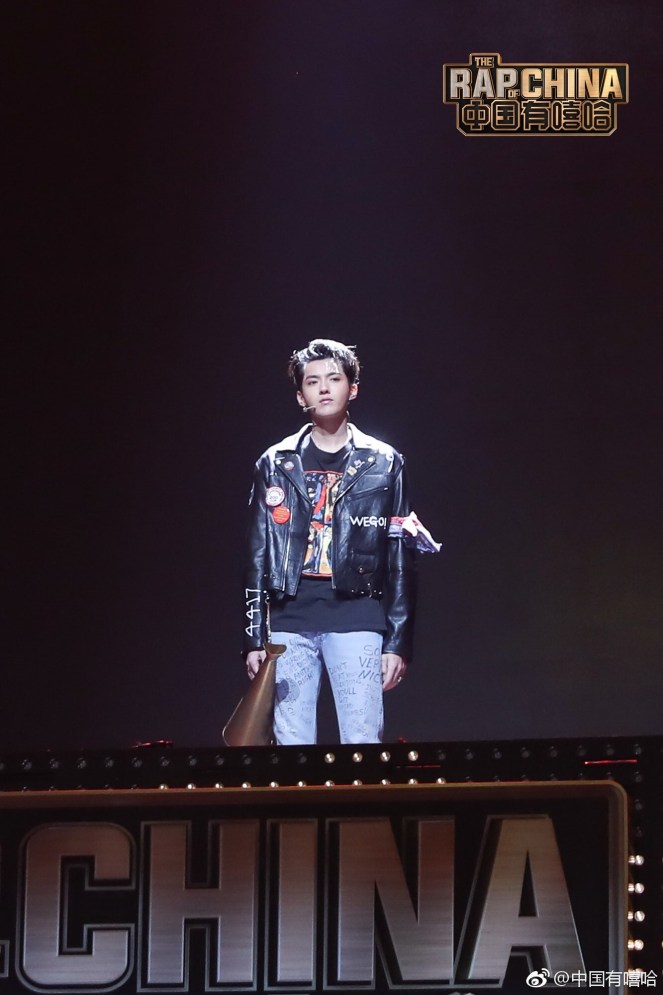At a recent press conference for iQiyi‘s ‘The Rap Of China‘, which bought the rights to Korea’s ‘Show Me The Money‘, Kris talked about a variety of things, and the whole thing is worth a read, but he surprised me a bit with his answers about hip-hop culture and what not.
—–
Most important, he is the hero we all deserve for trying to rid China of ballad dominance. Thank you, Krisus.
Sina: So the music you’re currently making does “try to cater to the public”?
Kris: Right, because I think in order to make a music genre, including its culture, universal and broaden its boundaries, you need the public to expand their understanding. So how do you get the public’s appetite? You need to take a familiar melody and put it in something new that you’ve created. After they’ve listened to it, they’ll think “ah, it sounds quite familiar, it sounds quite beautiful, but it doesn’t sound like the ballads I usually listen to and has a lot more beats to it.” That way, it might be easier for them to accept, that is my method.
Sina: Have you ever asked the production team why they asked you to become a producer? And what is the main reason this program attracted you?
Kris: I’ve never asked about the reason why they chose me. I believe they must have heard my music, that makes the most sense. I also didn’t really promote myself. As for my decision, I did have a lot to consider about doing this reality show. I really think that it’s a pretty good platform to promote hip hop culture. If you want something to do well, one person’s hard work is not enough. You need more fresh blood mixed together to push the entire market forward and attract a lot more music producers to do hip hop music. Perhaps some music producers will say, “The ballads I make earn more money and sell better. I have needs everywhere and hip hop has such a small audience. I don’t know where I can find investors so how could I maintain a living?” But now, we want to use this way to allow more people get into it and create more demand for it. This way, it will make the market consider it. So, I think, although I can’t say [the program] will definitely be successful, since no one really knows, it is definitely a good start.
Kris thankfully clarified that hip-hop doesn’t have to be all about aggression.
Sina: The “attitude” that hip hop lyrics present is the essence of this type of genre. For example, are there any topics that inspired you and made you want to express yourself?
Kris: I don’t actually have anything I really want to express right now, I’m quite well, right now. (laughs) You may be referring to the more rebellious attitude, to… to me, I don’t wish to write music that way. This is indeed the image that people have toward this genre. They think that it needs to give a fierce hit, but it’s actually not like that always. There are a lot of hip hop songs that cover different types of normal situations like walking on the streets, walking on grass, when by the sea (simple feelings like that). It’s not something that’s definite. The type you’re referring to is more of the gangsta rap type from back in the day, that’s one type but not everything is like that.
Kris goes on to talk about his experience around hip-hop and how people need to understand the culture.
Sina: Do you remember when was the first time you listened to hip hop?
Kris: When I was around 10 years old. At the time, I was overseas and I liked to play basketball. Basketball is also a sport that is dominated by black people and hip hop comes from American black culture. The mainstream breakthrough of hip hop started in America in the 90s, that was considered its golden age. Back then, I was still very young and in 2000 I stared to pay a lot of attention to it and really liked it. When I played basketball, I heard a lot of hip hop. When I watched basketball, they always played hip hop, so I really grew interest in the culture. At the time, I would bring around an mp3 player and it would be pretty much filled with hip hop music.
Sina: Nowadays, a lot of youngsters like hip hop, what do you think needs to be prepared in order to enter the hip hop circle? Or, what should they do?
Kris: First, I think you need to understand the cultural background and find a hip hop artist that you like. You need an idol, every person needs someone to learn from in order to grow. I think this is very important. I think right now we’re missing a platform, missing a method to allow them to join and express. This is also another reason why I came on this show. Before, the contest shows mainly focused on finding singers, people who sang well or are good looking, but The Rap of China is different. It’s entirely based on your musical talents and only focus on hip hop. You can’t get through with just singing love songs here, but if you sing well you’ll get extra points, definitely.
Sina: Do you think the way you dress is important when it comes to hip hop? Most people would start from copying the fashion, right?
Kris: It’s okay. But I feel like if you want to dress that way you should understand why you are dressed that way. For example, why do I wear such baggy pants? Why do I wear my pants at my crotch and expose half my ass? You need to understand the origin. A lot of hip hop fashion is baggy because back then the people were very poor and could only wear their parents’ hand-me-downs. So their clothes would be really big, they wear them from their youth until they get older.*** Why do they wear do-rags? Why do they style their hair like that? This is a culture, they need to understand the culture before they start dressing that way. Although, it is your freedom if you want to wear it without understanding the culture, but if you don’t understand it I think you’re missing the significance.
*** = This is referenced in Killer Mike’s song “That’s Life”
I guess you could quibble with some stuff if you really wanted to be extra, but I was pretty pleasantly surprised about his level of understanding. Like personally, that’s the deepest understanding I’ve ever seen an idol have and if he’s going to try to encourage and spread hip-hop from that vantage point, it’s hard to go wrong.
It was refreshing to read.
 Asian Junkie Asian pop. Without discretion.
Asian Junkie Asian pop. Without discretion.

